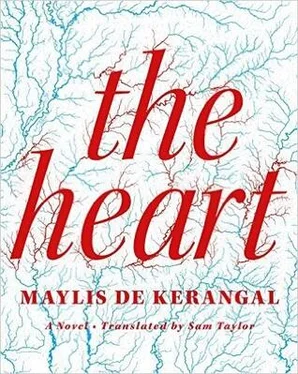Maylis de Kerangal - The Heart
Здесь есть возможность читать онлайн «Maylis de Kerangal - The Heart» весь текст электронной книги совершенно бесплатно (целиком полную версию без сокращений). В некоторых случаях можно слушать аудио, скачать через торрент в формате fb2 и присутствует краткое содержание. Год выпуска: 2016, ISBN: 2016, Издательство: Farrar, Straus and Giroux, Жанр: Современная проза, на английском языке. Описание произведения, (предисловие) а так же отзывы посетителей доступны на портале библиотеки ЛибКат.
- Название:The Heart
- Автор:
- Издательство:Farrar, Straus and Giroux
- Жанр:
- Год:2016
- ISBN:9780374713287
- Рейтинг книги:5 / 5. Голосов: 1
-
Избранное:Добавить в избранное
- Отзывы:
-
Ваша оценка:
- 100
- 1
- 2
- 3
- 4
- 5
The Heart: краткое содержание, описание и аннотация
Предлагаем к чтению аннотацию, описание, краткое содержание или предисловие (зависит от того, что написал сам автор книги «The Heart»). Если вы не нашли необходимую информацию о книге — напишите в комментариях, мы постараемся отыскать её.
The Heart
The Heart
The Heart — читать онлайн бесплатно полную книгу (весь текст) целиком
Ниже представлен текст книги, разбитый по страницам. Система сохранения места последней прочитанной страницы, позволяет с удобством читать онлайн бесплатно книгу «The Heart», без необходимости каждый раз заново искать на чём Вы остановились. Поставьте закладку, и сможете в любой момент перейти на страницу, на которой закончили чтение.
Интервал:
Закладка:
In fact, Révol often thinks that in 1959, rather than being a mere placid baby with the triple chin of a provincial politician, bundled up in a onesie, rather than spending two-thirds of his life asleep in a pale-straw, gingham-lined Moses basket, he would have preferred to be in that room, at the Twenty-third International Congress of Neurology, on the day when Maurice Goulon and Pierre Mollaret took the podium to present their findings; what wouldn’t he have given to see them speaking to the medical community — or, in other words, to the world itself — those two men, the neurologist and the specialist in infectious diseases, aged about forty and sixty, dark suits and polished black shoes, bow ties; he would have loved to have observed what he could of their relationship, the mutual respect that bridges the age gap, the silent hierarchy that always exists at meetings of scientists, my esteemed colleague, my esteemed colleague — but who speaks first? who has the privilege of concluding? Yes, the more Révol thinks about this, the more sure he feels that he would have liked to be there, that day, sitting among the pioneers of resuscitation — men, mostly, feverishly concentrated — would have liked to be one of them, in that place, the Hospital Claude-Bernard, a trailblazing hospital where Pierre Mollaret had created, in 1954, the first modern Intensive Care Unit in the world. He had formed a team, renovated the Pasteur Building so it could hold nearly seventy beds, ordered the famous Engstrom 150 electric ventilators, developed to deal with the polio epidemic that was raging in the north of Europe, and that would replace the “iron lungs” that had been used since the thirties. And, the more Révol concentrates, the better he is able to visualize this scene — this seminal scene that he never experienced in reality — the more he can hear the two professors whispering to each other, arranging their papers on the lectern, clearing their throats behind the microphones, waiting impassively for the hubbub to die down and silence to descend so that they can finally begin speaking in that cold, clear tone unique to those who, aware of the fundamental importance of what they are saying, feel no need to add anything, content simply to describe, describe, describe, laying down their conclusions the way you lay down four aces in a poker hand. Even now, the enormity of their announcement stupefies him. Because what Goulon and Mollaret said that day could be summarized in a single phrase that was like a cluster bomb exploding in slow motion: the moment of death is no longer to be considered as the moment the heart stops, but as the moment when cerebral function ceases. In other words: I no longer think, therefore I no longer am . The heart is dead, long live the brain — a symbolic coup d’état, a Revolution.
* * *
So the two men stood on the podium, facing their peers, and described the outward signs of what they now call the coma dépassé . They detailed several case histories in which patients, placed on ventilators, maintained their cardiac and respiratory functions without showing any cerebral activity — patients who, without new machines and techniques enabling a blood supply to their brains, would have suffered cardiac arrest. From there, they established that the development of medical resuscitation had changed everything, that progress in their field had led them to formulate a new definition of death, and that they assumed this scientific breakthrough — with its startling philosophical repercussions — would also have the consequence of authorizing and enabling organ transplants.
Goulon and Mollaret’s speech was followed by the publication of a crucial article in the Revue neurologique detailing twenty-three cases of coma dépassé . You undoubtedly remember the description of the books on Révol’s metal shelf, mentioning a copy of an issue of that magazine from 1959, so you will have already guessed that the article appeared in that very issue. Révol bought the issue on eBay and picked it up from the seller at the Lozère-École Polytechnique station on the RER B train line. He spent a long time waiting in the cold for the seller to arrive — a little lady in a topaz turban who trotted along the platform until she reached him, pocketed his cash, then extracted the magazine from a tartan shopping bag and craftily attempted to swindle him.
* * *
Révol, eyes riveted once again to his computer screen, duly records the boy’s death, closes his eyes, opens them, and suddenly sits up. It is 11:40 a.m. when he calls the department office. Cordélia Owl answers. Révol asks her if Simon Limbres’s family has been informed and the young nurse says yes, the police called his mother. She’s on her way now.
6
Marianne Limbres walks through the main entrance of the hospital and heads straight to the reception desk. There are two women there, sitting behind computer screens, two women wearing pale-green scrubs and speaking in low voices. One of them — the one with a thick black braid curled over her shoulder — looks up at Marianne: Hello! Marianne does not reply at first. She doesn’t know which department she should go to — Emergency, Intensive Care, Trauma Surgery, Neurobiology — and, struggling to decipher the list of departments listed on a large sign fixed to the wall, as if the letters, words, lines are overlapping and she can’t separate them, put them back in order, find any meaning in them, she ends up blurting out: Simon Limbres. Sorry? The woman frowns — her eyebrows thick and black too, meeting in a furry clump at the top of her nose — and Marianne tries again, managing two brief sentences this time: I’m looking for Simon Limbres. He’s my son. Ah. On the other side of the counter, the woman leans over her computer and the tip of her braid caresses the keyboard like a Chinese paintbrush. What was the last name again? Limbres— l, i, m, b, r, e, s —Marianne spells out and then turns toward the vast lobby, with its pillars, its cathedral-high ceiling and skating-rink floor: the acoustics, the gleam. It is silent here, hardly anyone around. A man in a bathrobe and flip-flops walks with the aid of a crutch toward a telephone on the wall; a woman in a wheelchair is pushed by a man wearing a felt hat with an orange feather — a neurasthenic Robin Hood — and, farther off, near the cafeteria, in front of a row of doors barely visible in the dimness, three women in white have gathered, holding plastic cups. I don’t see him. When was he admitted? The woman keeps her eyes on the screen, clicking her mouse. This morning, Marianne sighs, and the woman looks up again. Ah, so it’s ER. Lowering her eyelids, Marianne nods while the woman sits up, flicks her braid back behind her head, and points over to the elevators at the back of the lobby, then explains how to get to the Emergency Department without having to go outside in the cold and walk all around the buildings. Marianne thanks her and sets off again.
* * *
She had fallen back asleep when the telephone rang, buried in an interlacing of pale dreams that sifted the light of day and the shrill computerized voices coming from a Japanese cartoon on the television — later, she would unsuccessfully search the dream for signs: the harder she tried to gather her memories of it, the more it dissolved and she was left without anything tangible, nothing that could make any sense of the terrible shock occurring about twenty miles away, at that very moment, on a muddy road — and she wasn’t the one who answered, but seven-year-old Lou, running into the bedroom because she didn’t want to miss a second of what she was watching in the living room and simply dropping the phone on her mother’s pillow before running back out again, so that the voice on the other end of the line seemed to weave itself into Marianne’s dreams, speaking louder, insistent, and in the end it was only when she heard those words please, madame, answer me: Are you the mother of Simon Limbres? that Marianne sat up in her bed, her brain suddenly awakened by a rush of fear.
Читать дальшеИнтервал:
Закладка:
Похожие книги на «The Heart»
Представляем Вашему вниманию похожие книги на «The Heart» списком для выбора. Мы отобрали схожую по названию и смыслу литературу в надежде предоставить читателям больше вариантов отыскать новые, интересные, ещё непрочитанные произведения.
Обсуждение, отзывы о книге «The Heart» и просто собственные мнения читателей. Оставьте ваши комментарии, напишите, что Вы думаете о произведении, его смысле или главных героях. Укажите что конкретно понравилось, а что нет, и почему Вы так считаете.












